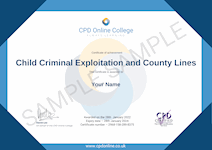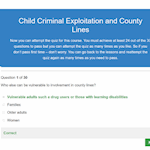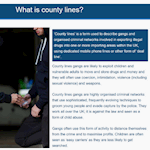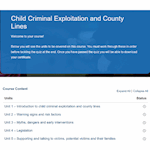Child Criminal Exploitation and County Lines CPD Course
Online CPD Course
CPD Online College
Summary
- Certificate of completion - Free
- Exam(s) / assessment(s) is included in price
Add to basket or enquire
Overview
Our child criminal exploitation and county lines course will give you insight into what child criminal exploitation (CCE) and county lines means and how to recognise the signs and how to help and support victims and their families.
CPD
Course media
Description
Throughout this course you will learn about child criminal exploitation (CCE) and county lines. Including definitions for these terms, statistics, myths, dangers and early interventions used for these children. You will also cover the signs and risk factors related to this, as well as relevant legislation.
You will also look at how to support and talk to victims, potential victims and their families. You will also learn about terminology normally associated with this topic, as well as some slang that may be used in regards to this as well. Throughout the course case studies/examples will also be provided.
In order to complete the course, you must achieve 80% or more in the final multiple choice quiz.
You will earn 3 CPD points on completion of the course, this course will take around 3 hours to complete and the certificate will last for two years.
- Unit 1 – Introduction to child criminal exploitation and county lines – In the first unit you will look at UK statistics that are associated with child criminal exploitation and county lines. You will learn what is meant by the term child criminal exploitation and what is meant by county lines. You will be given some examples of how to recognise signs of exploitation in children, where they are likely to come across people trying to groom them and who is likely to be exploited and why.
- Unit 2 – Warning signs and risk factors – In this unit you will learn about the warning signs to look out for in children who may be being groomed or exploited. You will also learn what makes children more at risk of exploitation and grooming including risk factors that make them more vulnerable, alongside some protective factors. Finally you will look at the importance of early intervention and the ways you can intervene early and how.
- Unit 3 – Myths, dangers and early interventions – In this unit you will consider some common myths and misconceptions, what practitioners can do to educate and support children on the dangers of child exploitation and county lines. You will then move onto looking at what push and pull factors are in regards to county lines, and examples of them.
- Unit 4 – Legislation – In this unit you will learn about some of the core acts and legislation that help to protect children, what education can be given to children at school, in what form and why it is important. Finally you will look at what the definition of partnership working is, who may be involved and why it is important to help look after children.
- Unit 5 – Supporting and talking to victims, potential victims and their families – In this final unit you will learn about supporting actual victims and their families. You will consider how to speak to them, the right questions to ask, barriers you may face when speaking to them and the affect the situation may have had on victims’ families.
Who is this course for?
Those working with children/teenagers
Requirements
You are required to complete an online quiz at the end of the course, you need to score 80% or above to pass and if you don't pass first time you can retake as many times as you need to pass.
Career path
Those working with children/teenagers.
Certificates
Certificate of completion
Digital certificate - Included
Reviews
Currently there are no reviews for this course. Be the first to leave a review.
Legal information
This course is advertised on reed.co.uk by the Course Provider, whose terms and conditions apply. Purchases are made directly from the Course Provider, and as such, content and materials are supplied by the Course Provider directly. Reed is acting as agent and not reseller in relation to this course. Reed's only responsibility is to facilitate your payment for the course. It is your responsibility to review and agree to the Course Provider's terms and conditions and satisfy yourself as to the suitability of the course you intend to purchase. Reed will not have any responsibility for the content of the course and/or associated materials.





